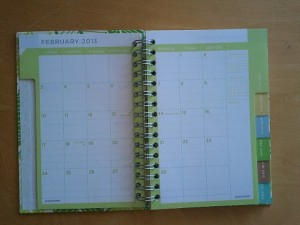Yes, I failed. And badly. In all ways. I couldn’t even track things properly for a calendar shot. My resolve to use the “Don’t Break the Chain” method, the least onerous version of goal-tracking that exists, failed at the same time my resolution to journal did. I didn’t even have the will to go back and track my “secret” goal after February 4th, the day I last journaled.
State your goal publicly– the journaling failure.
On February 5th, I just didn’t have the will to force myself to write more free-form introspective tripe pulled from my Prompt Box. On February 6th, I just completely forgot, and the 7th, even though I made a mental note to resume my journaling practice, I never got around to it. By the 8th, I’d just completely given up and had no desire to resume the next week. I’d like to use my two-week long bout with the flu as an excuse for not resuming on February 11th, but really, I just didn’t want to.
I found myself avoiding blogging completely the week of the 18th because I didn’t want to admit my failure. So, not only did I fail, but I procrastinated on admitting said failure. Kind of pathetic if you think about it.
Secret goal failure — not really a failure. More a postponement.
I actually was successful at my more secret goal. I kept up the practice until Saturday, February 9, even if I didn’t “track” it. I exercised four times that week, and only when Saturday’s extremely strenuous workout made me succumb to the flu with only three hours’ advance warning did I temporarily give up. Still, the buildup and the prior workouts left me addicted to exercise, and I ended up suffering major withdrawal pangs when I could finally get out of bed on February 14th. I’m doing a modified “schedule” this week: yoga twice and the boxing-ish bootcamp workout this Saturday.
Conclusions? Not what you’d think.
- Goal-tracking sucks. I’ve never been good at keeping any kind of routine tracking going for a long period. Never. So, I’m not surprised I couldn’t keep up with even the simplest method. I liked my first week of Xs, but they didn’t exactly motivate me. I didn’t care about not having a second. I usually keep track of progress mentally, so that’s not a particularly surprising conclusion for yours truly. Adding another habit, the tracking habit, to the additional two I was trying to establish was stupid, honestly.
- Journaling isn’t something that’s actually important to me. In fact, it seems actively toxic. Some people find journaling therapeutic. Some people find that writing things down helps them get their problems out of their heads. I’ve always used writing things down as a method for remembering dates, facts and events, not as a way to clear mental clutter. I naturally ruminate over everything. Writing down my ruminations just added more introspective claptrap to my already self-paralyzing analytical process. What actually made me stop journaling was the topic on February 4th: “What 5 things do you want to do before it’s too late?” I already spend too much time thinking my impending death and running out of time, but this had me actively contemplating how I’d die. Not exactly fun stuff.
- I’m trying to create a new habit in addition to my “artificial” experimental habit that’s actually important to my well-being. I’ve already written about my early forays into the realm of cooking; I’m trying to gain more control of my horrible diet. That’s far more important to both my short-term and long-term health than is writing in a journal. So, maybe I’m suffering from habit-forming overload, which is apparently a real concern.
- Is setting a specific goal really something that should be done in the first place? This is something I’ve really been wondering about. Every last bit of motivational writing you come across talks about the values of setting specific time-based goals, and making sure they’re realistic (SMART goals, anyone?). I’ve never had a lot of luck with that approach. Somehow, no matter how specific and how “realistic” I think I’m being when I set a goal, I’m always way off, and I end up being discouraged for not perfectly achieving what I set out to do. I find I’m better off aiming for a loose future objective, and making subtle course-correcting tweaks as I go along.
Cognitive reframing?
My “secret” goal of exercising an hour (at least) four times a week is one that I’ve actually had to step away from as a “goal.” My best success in the past has come in finding disciplines I enjoy, and looking at exercise as another way of playing. At this point, my theoretical exercise schedule (and, oh how I hate that word!), is pretty rigid with four separate exercise classes, something that could drive me to insanity if I think about it that way.
I’ve already mentioned that I loathe too much structure and too much “tracking,” I think, and if I haven’t specifically, there it is. Structure to me is death. It’s routine. It’s confining and painful and the very antithesis of enjoyable. Tracking after the fact is more routine and structure added to my life. Four separately scheduled events, then, adds that much more “routine.” It helps that I enjoy said events, but if I think about them too much in scheduling terms, I find I don’t enjoy them as much, even if I objectively do.
The brain’s a funny organ, isn’t it? You can trick it and manipulate it into doing anything if you really try. That’s what I’ve been doing on the exercise front so that I keep enjoying myself. Instead of “going to classes” that happen at “specific times,” I tell myself, It’s time to go play! Suddenly the dull routine of changing clothes and driving through sometimes awful traffic to arrive at said classes doesn’t seem quite so onerous. I put on my play-clothes and I sit myself in my play-car, and I sing along with old 80’s songs as I’m stuck at long traffic lights because it’s fun-time. And then I’m sweating because I’m playing, not because I’m engaging in strenuous physical activity.
Future plans…
Maybe I’ll try the experiment again someday when a sickness won’t derail it. I really would like some real answers to come from it, and I’m curious to see if I’ll ever be able to make concrete goal-setting work for me in any fashion.



